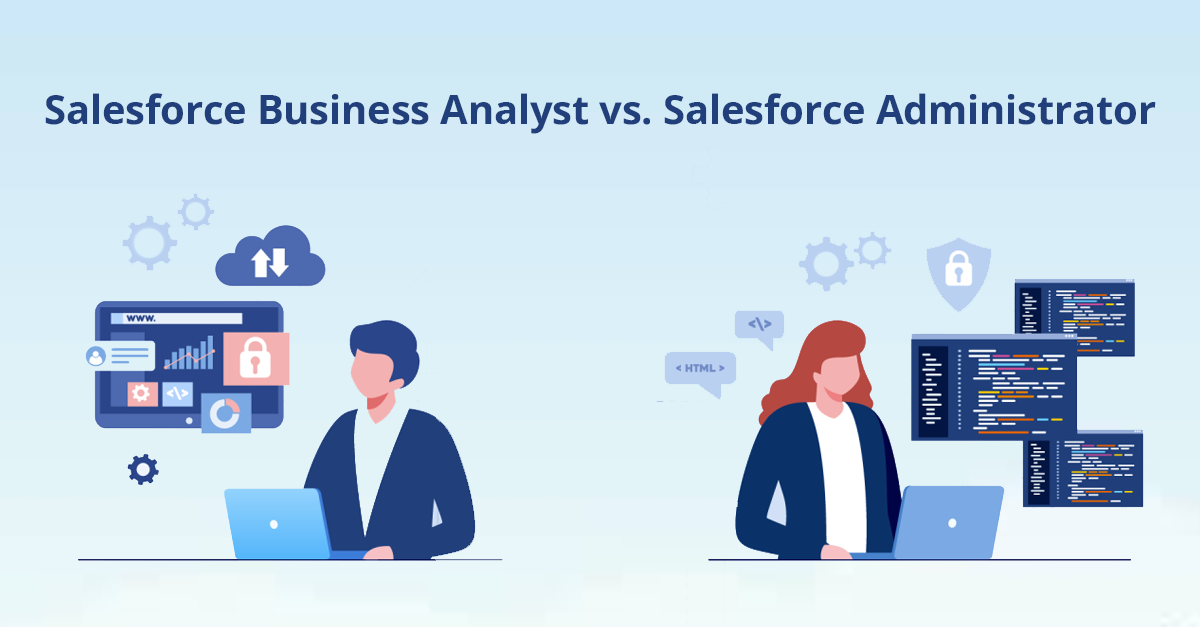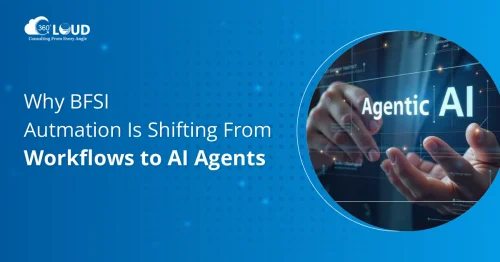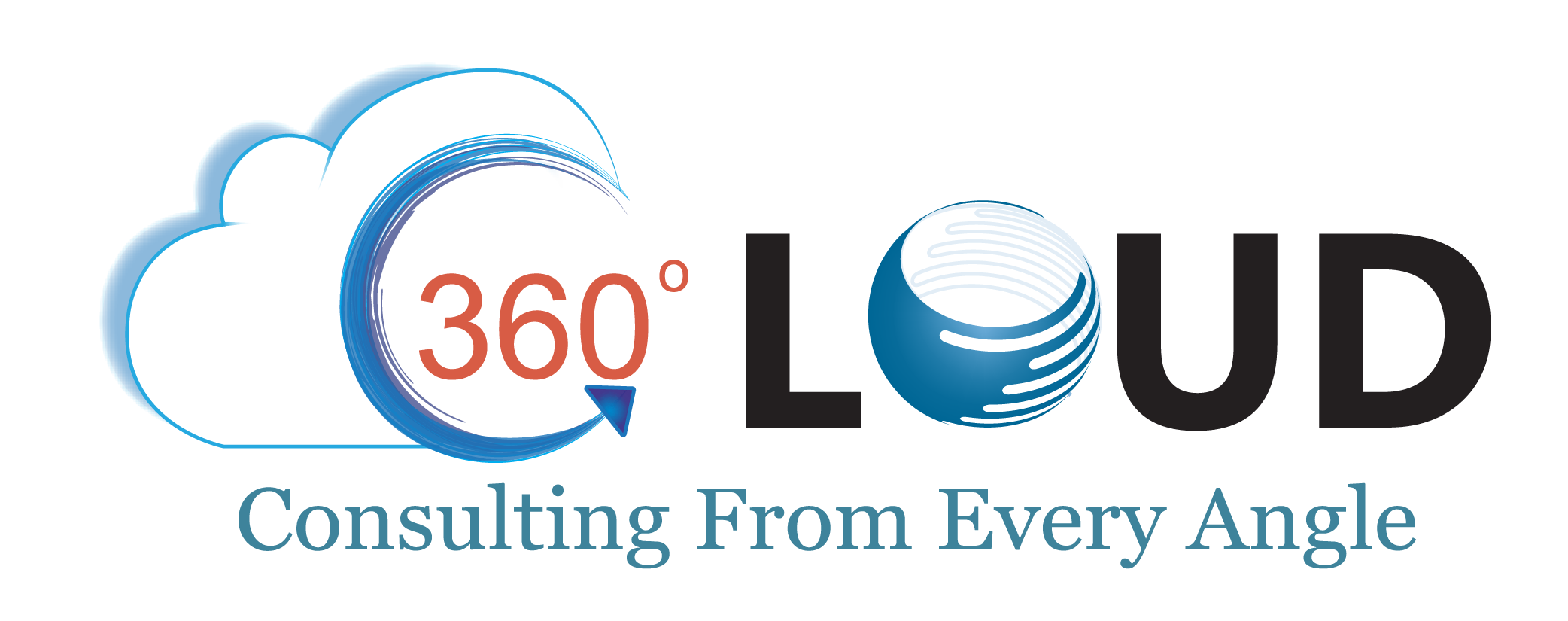Difference Between Salesforce Business Analyst and Salesforce Administrator Explained
11 Jul 2023
Table of Contents

With more and more companies striving toward growth, the idea of hiring external resources has become common. But when looking for Salesforce professionals, you’ll come across different experts. Two titles that are often sought after are Salesforce business analyst and Salesforce administrator.
Although both kinds of professionals have their own importance, people often get confused about their respective roles and responsibilities. But it’s crucial to understand what these professionals individually do so you can make the right decision when hiring your experts.
So, in this blog, we’ll be uncovering how these two profiles are different from each other while covering the key responsibilities associated with them.
Table of Contents
Who is a Salesforce Business Analyst (BA)?
As the profile name suggests, a Salesforce BA is majorly responsible for thoroughly analyzing your business requirements, which will be further translated into specifications for implementing Salesforce.
A Salesforce Business Analyst would have to work in alignment with other Salesforce stakeholders, trying to understand their requirements. It could be regarding the new implementation or understanding the area of improvement to meet their goals and business objectives. In addition to this, the BA’s role also includes evaluating if the Salesforce solution is aligned with the organization’s business strategy.
Who is a Salesforce Administrator?
You surely have heard many companies hiring Salesforce admins, but have you ever wondered what exactly these professionals do?
The role of a Salesforce administrator involves managing user accounts, customizing, and configuring the Salesforce solution so the business’s unique needs are met. The admin also ensures that the Salesforce solution is managed on a daily basis.
A Salesforce admin’s responsibilities also involve creating and managing personalized reports and dashboards, enabling the team to track accurate and up-to-date data. They make sure that the Salesforce solution made for the organization is secure and that the potential end users are trained to use it well.
Salesforce Business Analyst vs. Salesforce Admin: Key Differences
Both Salesforce BA and Salesforce Admin have their unique roles and responsibilities when it comes to handling Salesforce requirements by customers. But users often get confused about their responsibilities and fail to understand the difference between both profiles.
We can help you here. We’ve differentiated these profiles on the basis of different factors that will help you understand what makes these profiles unique.
1. Focus
The major focus points of both Salesforce BAs and admins are quite different from each other. The prime focus of both of them remains on the Salesforce org but on different aspects. A Salesforce admin’s focus remains on ensuring the Salesforce solution works efficiently.
On the other hand, a Salesforce business analyst would work to ensure that the Salesforce solution implemented aligns with the client company’s overall business strategy.
2. Skillset
Even both Salesforce BAs and admins have different skillset from each other, despite working on similar aspects. For a Salesforce administrator, having complete knowledge of Salesforce features and functionalities is necessary. In addition to this, a Salesforce admin also needs to have knowledge of security features on Salesforce and data management approaches.
If we talk about a Salesforce BA, the professional usually need to have strong problem-solving and analytical skills, with a thorough understanding of workflows and business process.
3. Engagement with Stakeholders
Both Salesforce BAs and admins have to be in close alignment with stakeholders, but the nature of interaction that they conduct with them is entirely different from each other. The responsibility of a Salesforce admin is majorly associated with training the potential end users of the Salesforce solution.
On the other hand, the responsibility of a Salesforce business consultant is to understand the requirements and expectations of stakeholders through detailed conversations. The interaction is carried out so that the needs can be understood and translated into functional specifications that will be used to implement or customize the solution.
How Do You Decide if you want a Salesforce BA or a Salesforce Admin Consultant?
It can be tricky to choose if you want to hire a Salesforce admin or a Salesforce business analyst when you don’t know the difference between both. We have listed here some aspects that would help you make the right choice:
1. Business objectives: There can be times when your requirement would be to optimize the efficiency of your Salesforce platform. In such a case, you would need a Salesforce admin to do the job. But if your requirement is to align the business strategies and objectives with the Salesforce solution, a Salesforce BA could help you the best.
2. Challenges you need to overcome: If you need to overcome challenges related to managing user accounts or platform customization, an admin could be your right choice. But if your challenges involve understanding the requirements of a business or making the solution work in alignment with the business strategy, a BA could help you with it.
3. Skills you need: If you need someone who understands Salesforce features better, hiring a Salesforce admin is what you need to consider. But a BA could assist you better if you need someone with strong problem-solving skills.
Get Salesforce Professionals Who Suit Your Needs
Your needs for Salesforce professionals could be different at different times. Someday you might need someone to evaluate the business requirements of the client while another day, you might need a certified Salesforce developer to handle the technical parts of a project. This is why you need to get along with a Salesforce certified consultant who can provide you with all kinds of resources for any timeline.
So, whether you need a Salesforce BA, admin, or developer, contact us and get the right professionals to satisfy your business needs. Contact us if you are stuck anywhere, and we’ll help you choose the right Salesforce professional for your business needs.
FAQs
How can a Salesforce business analyst help you?
When it is about leveraging the full potential of Salesforce, businesses always look for certified Salesforce business analysts. These analysts are responsible for working closely with different stakeholders to understand the business processes, requirements, and objectives. They help businesses by conducting thorough analyses and managing the complete documentation of the stakeholders’ needs, and translating them into actionable requirements for Salesforce implementation and development. Another key responsibility of a Salesforce business analyst is to ensure smooth user adoption of the Salesforce system. They design and deliver training programs to educate users on system functionality, best practices, and how to maximize productivity.
How can a Salesforce administrator help you?
A Salesforce administrator plays a crucial role in managing and maintaining the Salesforce platform to support your business operations and drive productivity. Salesforce administrators handle user management tasks, including creating and managing user accounts, assigning roles and permissions, and controlling access to data and functionalities. They ensure that users have the appropriate level of access and security settings based on their roles and responsibilities. Salesforce administrators oversee data management activities, such as data import, data cleaning, and data deduplication. They maintain data integrity, perform regular data backups, and monitor data storage usage to ensure optimal system performance.
About the author
Editorial Team – 360 Degree CloudThe Editorial Team at 360 Degree Cloud brings together seasoned marketers, Salesforce specialists, and technology writers who are passionate about simplifying complex ideas into meaningful insights. With deep expertise in Salesforce solutions, B2B SaaS, and digital transformation, the team curates thought leadership content, industry trends, and practical guides that help businesses navigate growth with clarity and confidence. Every piece we publish reflects our commitment to delivering value, fostering innovation, and connecting readers with the evolving Salesforce ecosystem.
Recent Blogs
 Salesforce Services
Salesforce Services
Top Salesforce Consulting Companies in the USA: How to Choose the Right Partner
Do you know 70% of customer Salesforce implementations are conducted by Salesforce consulting partners? This number clearly indicates how important Salesforce consulting firms are for businesses that…
Read More Salesforce Services
Salesforce Services
How to Eliminate Productivity Bottleneck with Spring ‘26 Release
For firms built on the Salesforce ecosystem, Spring ’26 Release is more than just a software update. It is a strategic pivot point that directly affects how fast teams move, how cleanly they operate, and…
Read More Uncategorized
Uncategorized
Why BFSI Automation Is Shifting From Workflows to AI Agents
Banking is not losing to fintech because it lacks features. It is losing time in execution. A customer uploads KYC docs, but the verification queue is backlogged. A fraud…
Read MoreReady to Make the Most Out of Your Salesforce Instance?
Our Salesforce aces would be happy to help you. Just drop us a line at contact@360degreecloud.com, and we’ll take it from there!
Subscribe to our newsletter
Stay ahead with expert insights, industry trends, and exclusive resources—delivered straight to your inbox.





